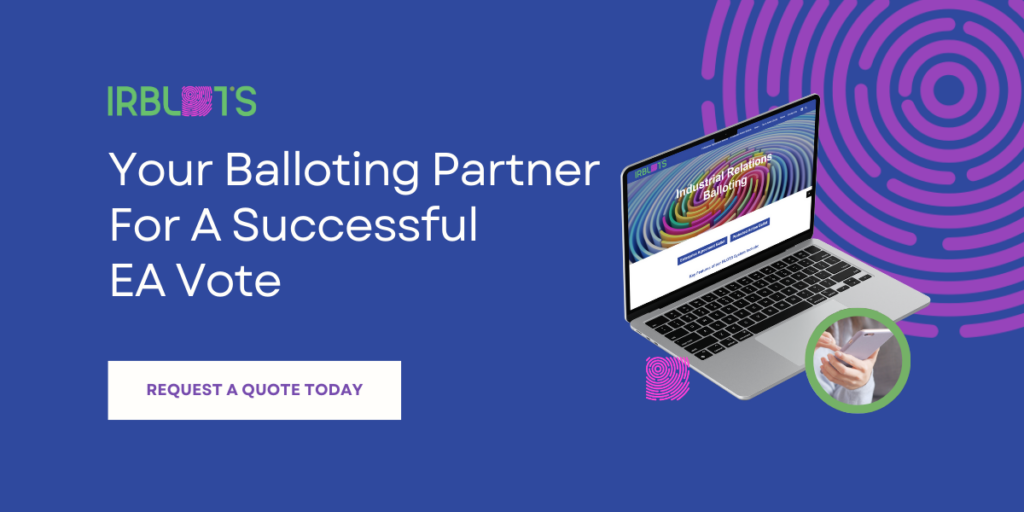One would think this is a simple question, but the answer is—it depends. Whether a casual employee can participate in voting for a proposed enterprise agreement is determined by two key factors:
- The employee must be employed by the employer at the time of the vote.
- The employee must be covered by the proposed enterprise agreement.
Understanding these conditions is crucial to ensuring compliance with Fair Work Commission (FWC) regulations and avoiding potential challenges to the validity of the vote.
What Does “At the Time of the Vote” Mean?
To be eligible to vote, an employee must be employed during a specific timeframe, which begins at the start of the access period and ends immediately after voting commences.
Voting typically occurs over a 12-to-24-hour period but may extend over several days. Employees must be employed within this window to participate in the vote.
What Is the Access Period?
The access period is a mandatory seven-day period before voting begins. During this time, employers must provide employees with access to the proposed enterprise agreement and related materials to allow for an informed decision.
Who Is Eligible to Vote?
Only employees who:
- Will be covered by the enterprise agreement, and
- Are employed on the day voting starts or during the seven clear days preceding it are eligible to vote.
Employees whose employment ends before the access period begins or who commence employment after voting starts are ineligible to vote. This rule can create complexities in determining eligibility, particularly for casual employees.
Voting Eligibility Scenarios
| Scenario | Eligible to Vote? |
|---|---|
| Employed before the access period but not on the day voting starts | No |
| Employed during the access period but not on the day voting starts | Yes |
| Not employed during the access period but employed on the day voting starts | Yes |
| Not employed during the access period or on the day voting starts, but employed during the remainder of the voting period | No |
| Not employed during the access period or voting period but employed afterwards | No |
These distinctions highlight the importance of accurately determining an employee’s status during the voting period.
Case Law on Casual Employees and Voting Rights
Two key cases provide guidance on how employment status affects voting eligibility:
1. National Tertiary Education Industry Union v Swinburne University of Technology
In this case, the Full Court determined that an employer should only request employees to vote under s.181(1) of the Fair Work Act if they are employed at the time of the vote. Casual employees who are not actively working on a particular day or during the relevant period are unlikely to be considered employed for voting purposes.
2. McDermott Australia Pty Ltd v AWU & AMWU
In this case, the Full Bench of the FWC ruled that casual employees who had accepted ongoing employment offers were still considered employed at the time of the vote, even though no work was performed during the voting period. This decision illustrates how an employee’s broader employment arrangement, rather than just work activity on a given day, can determine voting eligibility.

Practical Considerations for Employers
To reduce the risk of ineligible casual employees voting, employers should take the following steps:
> Select the Voting Cohort Carefully
- Review the workforce and exclude casual employees who are “on the books” but no longer actively working.
- Define clear parameters for determining whether casual employees are employed during the access period or on the voting day.
- Use rosters, timesheets, or manager confirmations to verify casual employment status.
> Consider Offering Shifts
- Employers should be aware that offering shifts during the access period or on the first day of voting makes those employees eligible to vote.
> Use a Controlled Voting Methodology
- Implement a voting system that only allows casual employees who are actively working during the access period or voting period to participate.
- For example, a voting platform accessible only through the company intranet could restrict participation to employees who are rostered on.
> Time the Vote Strategically
- Scheduling the vote during regular working hours may increase participation from casual employees who are likely to be rostered on.
> Collect and Analyse Voting Data
- Employers should use a voting system that captures key information about voters, including:
Casual employment status
Whether they worked during the access period or voting day
How they voted (yes or no)
This data is critical in case the vote is challenged. The FWC may require evidence that the enterprise agreement received a valid majority vote from eligible employees.
Can Ineligible Employees Impact the Vote?
Even if ineligible employees vote, this does not automatically mean the enterprise agreement will be rejected. The agreement can still be approved if:
- The employer can demonstrate that any ineligible votes did not change the outcome, and
- The agreement meets all other Fair Work Act requirements.
However, preventing ineligible employees from voting in the first place is always the best approach to avoid unnecessary disputes.
Key Takeaway
Determining whether casual employees can vote on an enterprise agreement depends on when they are employed relative to the access period and voting period. Employers must carefully manage their voting process to ensure compliance with Fair Work requirements and avoid potential disputes.
For expert assistance in managing your enterprise agreement vote, contact IR BLOTS today.

Submit the below form to a receive a balloting quote for IR BLOTS to conduct your Industrial Relations Ballot
Posted in Uncategorized

